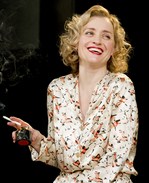SITE GUIDE
SEARCH
REVIEWS
REVIEW ARCHIVES
ADVERTISING AT CURTAINUP
FEATURES
NEWS
Etcetera and
Short Term Listings
LISTINGS
Broadway
Off-Broadway
NYC Restaurants
BOOKS and CDs
OTHER PLACES
Berkshires
London
California
New Jersey
DC
Connecticut
Philadelphia
Elsewhere
QUOTES
TKTS
PLAYWRIGHTS' ALBUMS
LETTERS TO EDITOR
FILM
LINKS
MISCELLANEOUS
Free Updates
Masthead
Writing for Us
A CurtainUp  London Review
London Review
 London Review
London ReviewCause Célèbre
|
A woman has a choice between her lover and her children and she puts her lover first. — Christopher
|

Anne-Marie Duff as Alma Rattenbury (Photo: Johan Persson) |
Cause Célèbre was written in 1976 when Rattigan was dying of cancer but is based on the court case of 40 years earlier. Where Rattigan has added to the drama is in pairing the accused woman Alma Rattenbury (Anne-Marie Duff) with the fictional woman who is to become the foreman of the jury, Edith Davenport (Niamh Cusack). These women, apart from both being from roughly the same class although the Rattenburys are more affluent than the Davenports, could not be more different. Alma is pretty, confident and alluring; Edith is plain and awkward, inelegant and stiff, as tight as her ugly perm. Alma is a free spirit sexually, rather shocking for her era, whereas Edith cannot forgive her husband's infidelity after she has denied him normal marital relations and forbids their son to stay with him.
The staging highlights the differences between them with both women onstage together, isolated at either side of the front of the stage, while behindHildegarde Bachtler's set, in almost darkness, a huge staircase sweeps up. Scenes in the play flit back and forth in time as the story is told. Simultaneously we hear about the failure of Edith's marriage through a discussion between her husband John (Simon Chandler) and son John (Freddie Fox) about the mistress called "that woman", and the appointment of a manservant in the Rattenbury household. (Percy) George Wood (Tommy McDonnell) is the applicant and immediately we can see the flirtatious body language between him and his potential employer as he stands closer to her than is usual and she provocatively touches him to push him away. Alma interviews him wearing silk pyjamas and we then meet her kind but aged, husband Francis (Timothy Carlton) who is several decades her senior as she pleads with Francis to employ George as their chauffeur.
The stage is split horizontally with an upper playing area which becomes the prison cell that Alma is held in pending her trial. Nicholas Jones is well cast as Alma Rattenbury's eloquent barrister charged with defending a client who baffles him by her refusal to offer a defence and who initially declines to go into the witness box. Despite her attempt to be excused from the jury on the grounds that she is prejudiced against the woman defendant, Edith is selected and made foreman after declaring that one of her relations was a judge. As the policeman gives evidence about the night of the murder, the scene is replayed for us with Alma drunk and giggling. Later we see the re-enactment of the murder, grisly and bloody as Francis Rattenbury has his skull bashed in. The courtroom scenes have knife edge debate between the opposing barristers and the ups and downs of an unpredictable court case.
Anne-Marie Duff gives the performance of a lifetime. Blonde and vivacious, Alma would have been on trial in the 1930s for her sexual infidelity although the charge was murder but the talented Duff never lets her become a villainess. Even the hard hearted prison warder warms to her likeable personality. Niamh Cusack is also very good, unforgiving and gauche with her rendering of the received pronunciation, that very tight way the English upper middle classes spoke in the 1930s, as the juror who has to make a difficult decision. There is good support from Lucy Robinson as Edith's more socially adept sister Stella and Nicholas Jones has exactly the right gravitas as the defending barrister.
I won't reveal the outcome here except to say that it is tragic and unexpected. I am so impressed with the Rattigan repertoire that we are having an exciting year with the revivals of his well constructed plays. Thea Sharrock's outstanding production brims over with period feel like being plunged back into and immersed in the 1930s in Britain when hanging was the penalty for murder. Don't miss Cause Célèbre!
|
Subscribe to our FREE email updates with a note from editor Elyse Sommer about additions to the website -- with main page hot links to the latest features posted at our numerous locations. To subscribe,
E-mail: esommer@curtainup.comesommer@curtainup.com
put SUBSCRIBE CURTAINUP EMAIL UPDATE in the subject line and your full name and email address in the body of the message -- if you can spare a minute, tell us how you came to CurtainUp and from what part of the country. |
| Cause Célèbre
Written by Terence Rattigan Directed by Thea Sharrock Starring: Anne-Marie Duff, Niamh Cusack, Nicholas Jones, Jenny Galloway, Lucy Robinson, Simon Chandler, Tommy McDonnell, Freddie Fox With: Tristram Wymark, Timothy Carlton, Oliver Coopersmith, Rory Fleck-Byrne, Richard Teverson, Sarah Waddell, Tristan Shepherd, Patrick Godfrey, Richard Clifford, Michael Webber Design: Hildegarde Bechtler Lighting: Bruno Poet Composer: Adrian Johnston Sound: Ian Dickinson for Autograph Production sponsored by Bank of America, Merrill Lynch and American Airlines Running time: Two hours and 35 minutes including an interval Box Office: 0844 871 7609 Booking to 11th June 2011 Reviewed by Lizzie Loveridge based on 31st March 2011 performance at the Old Vic, Waterloo Road, London SE1 8NB (Rail/Tube: Waterloo) |
|
REVIEW FEEDBACK Highlight one of the responses below and click "copy" or"CTRL+C"
Paste the highlighted text into the subject line (CTRL+ V): Feel free to add detailed comments in the body of the email . . . also the names and emails of any friends to whom you'd like us to forward a copy of this review. |




